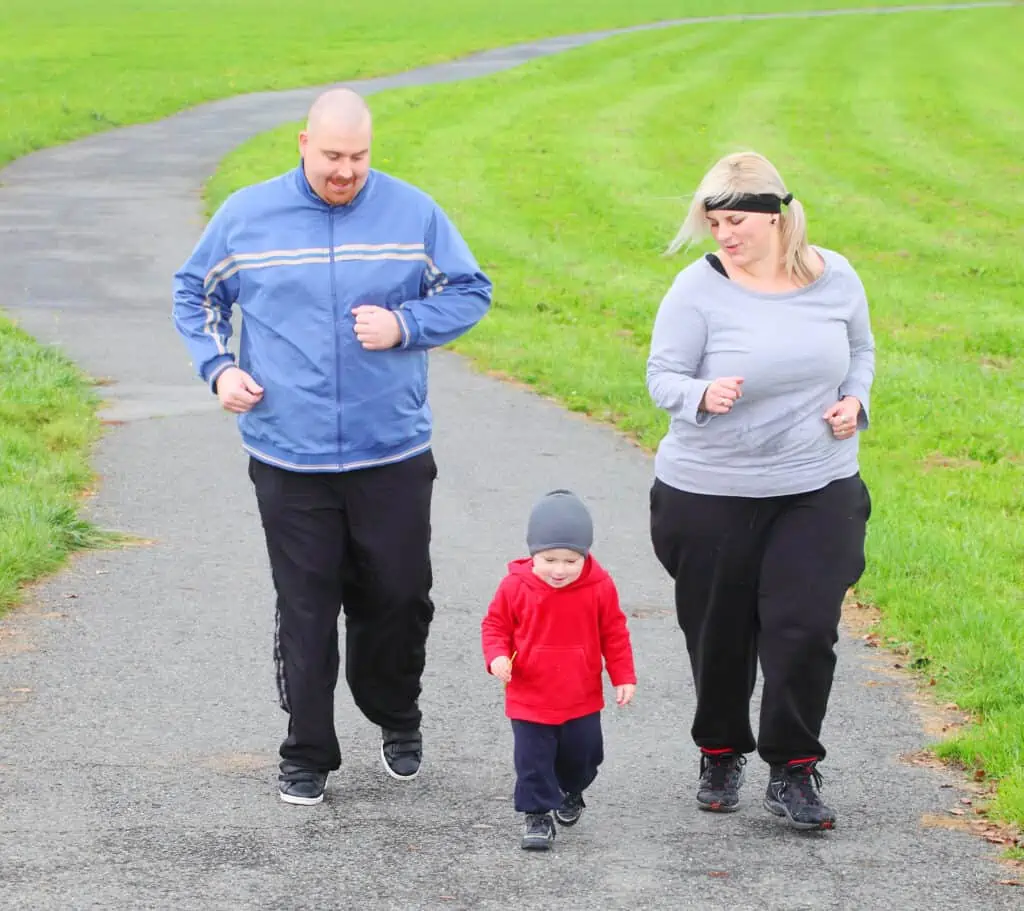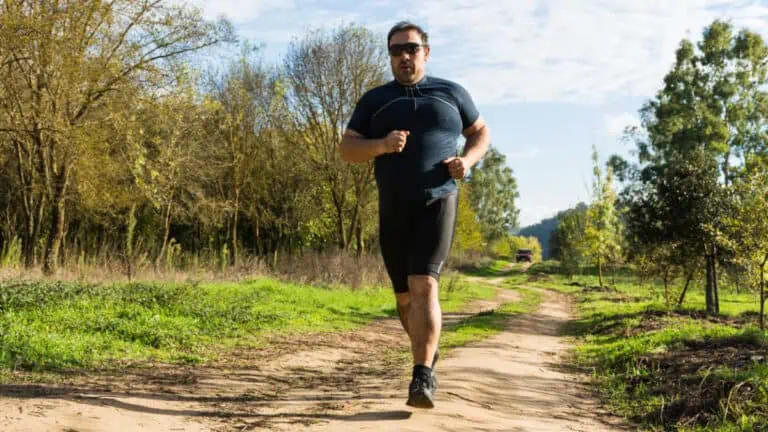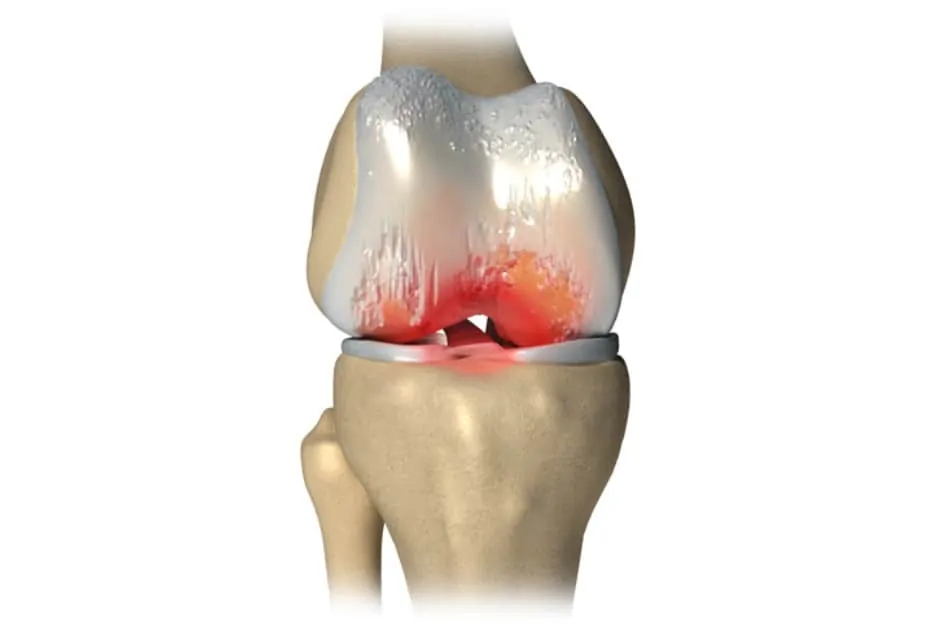I never do anything small. It drives my wife nuts. If I’m dieting, you better believe I’m doing a 48-hour fast. But if I’m not dieting? You better get to Papa John’s before I do or you’re not getting anything. Moderation just doesn’t work for me.
So when I decided to get back into running as a middle-aged obese man I started looking at 100 miles long off-road running races. Ya know, during my breaks at work while eating a doughnut.
It was just way more inspiring to me than thinking about jogging a 5K.
Unfortunately, my entire motivation and aspirations were upended when I tried to go out for a run. While I was in college, running a 100-mile race would have been a crazy lofty goal.
Now it was just stupid.
It turns out that even maintaining a jog for more than 2 minutes would be a lofty enough goal that I could be proud of.
Around this time I had a friend who got was really getting into running and challenged me to run a 5K with him (as he was training for a triathlon). Being the sucker I am, I agreed and we set a date for about 3 months in the future.
Since I was a couch-dwelling potato that I was at the time I knew I needed to find a way to improve my running health and get up to speed (so to speak) very quickly. This is what led me to try a couch to 5k program.
While there are tons of couch to 5k programs out there, none of them are really tailored to obese people. In fact, nobody seems to tailor anything to obese people. It took me forever to find a pair of running shoes suitable for a fat guy and then even longer to find a program.
However, if you’re obese and you’re looking to do a 5k anytime within the next year, time is not a luxury you have. You need to start training NOW!
Luckily, I’ve already done all the research, popped all the blisters, and been through hell so you don’t have to. Well, you’ll probably have to do the last two, but at least the research is done!
Crafting A 5k Running Program For Morbidly Obese People
Getting started with running was a painful reality check for me. I had “chased” my daughter around at the park but I hadn’t tried to all-out run for years. It made me face the harsh reality of what I had done to my body and how out of shape I really was.
While the entire experience brought me a lot of clarity, I can distill most of what I learned down to 5 things that will make you a better and more successful runner if you’re obese:
5 Things I Had To Get Through My Head
- Start small. Maybe a 5k is too big of a goal. If I’m honest, it was probably a bit too ambitious for me. But if all you can do is walk around the block (or around your house) then that’s fine. Just walk a little bit farther next time.
- Running is not what you remember. I ran track in high school but I had to let go of all those memories and expectations when I started running as an obese guy. My new reality involved chafing, sore joints, and my lungs on fire. I could deal with all of those things as long as I didn’t try and compare them to how running was in my memory.
- If you’re not fit, your diet is even more important. If you’re lean and fit, you can probably get away with eating poorly while trying to be a runner. However, running was hard enough for me that, if I messed up my diet, running became completely out of the question.
- Relying on caffeine or stimulants to fuel your runs is counter-productive. If you want to have the natural energy and motivation needed to run and lose weight for a long period of time, you need to detox from caffeine. I felt better, slept better, had fewer headaches, and was actually able to focus better when I learned the actual process of fully detoxing.
- You don’t have to kill yourself to make progress. If you focus on enjoying yourself, results will come whether it be weight loss or anything else. It’s more important to enjoy what you’re doing than try and do everything. If you’re not having fun, you’re going to quit and not make it to your goals anyway. Remember, long-term consistency trumps short-term intensity.
*If you want to get into running as an obese person (or any other new physical activity for that matter) talk to your doctor first. This is not a funny/glib thing like it was when you were thinner/younger. Seriously, get checked out first and make sure you are in good enough health to start an exercise routine.
The Best Couch to 5K App for Obese People
As an obese guy, I typically need things tailored to my weight. I can’t sit in normal camp chairs, wear normal shoes, or fit into skinny jeans (at least I shouldn’t fit into skinny jeans…)
So it might be surprising to you then that I found the same Couch to 5k Program/App that works for everyone else worked well for me too! Since every single person who decided to run a 5K is at a different level of fitness, it really didn’t matter when I started that I was obese.
The only caveat to that is that you have to find a quality app that will take into account your current fitness level and size. If it simply spits out a generic 8-week program for you to follow, it’ll probably be discouraging.
I downloaded 13 different running apps before deciding on my favorite: 5K Runner (couch potato to 5K) by Fitness22. In fact, I ended up deleting all my other apps and simply using that one exclusively. The reason that the app is amazing is that it will craft a plan specifically for you based on your current abilities, fitness levels, and weight. It actually projected that I would need 4 months to prepare for a 5k but I just did it before the app said I was quite ready.
Here’s the one thing: the app is paid. However, you can see your first 4 workouts for free (with a free trial) so you can figure out whether the app is for you or not. Even though the app is paid, I’m not receiving any sort of money or compensation for recommending it you to. I just genuinely think that’s is the best way to get into running as an obese or overweight person!
My plan was just 30 minutes, 3 times a week. I found it super easy to fit into my schedule and the app itself is motivating and well laid out. Well worth the $10 I paid for lifetime access.
The entire point of preparing to run a 5k using an app like this is that you are not in competition with anyone but yourself. You don’t have to hit any certain times or run at any great speed. In fact, any Couch to 5k app will work just as well if you can’t run at all!
This leads me to my next point. As much as I hated it, I needed to be realistic.
Running While Obese: Realistic Expectations

So I’ve been using the word “run” during this article so far quite loosely. Let me be absolutely clean. I did not run a 5k. I finished a 5k. No one said you have to run to successfully complete your couch to 5k as an obese person.
If you are new to running, view your first 5k just like another preparation run. Don’t make a plan to run a single 5k, but plan to run once every couple of months and improve every time. You can’t adequately prepare or set goals until you’ve done it the first time so get going.
While everyone is different, I’ve found that most obese people who are generally physically active are 3-4 months away from finishing a 5k if they are consistent on both their training runs and their diet. This may not be true for every overweight runner but it was for me.
What’s A Good Starting 5K Time For Obese Beginners?
The 5k starting time for the average runner is just over 22 minutes, so can you simply double that if you’re obese?
No.
That’s because an obese person at their debut 5k is also a beginner. The average time for a beginner to run a 5k is around 30 minutes.
Depending on how obese the runner is, one hour to eighty minutes can be sufficient for running a 5k. In most cases, obese runners who have enough practice can finish a 5k run in 45 to 50 minutes.
A range of factors affects how you perform in a 5k and what your starting time should be. Age and gender play a role, with female runners having lighter bone mass and muscle weight and older participants requiring more breaks.
Starting with 1 hour as a base time, you can go through the chart below and figure out what a goal should be for you to shoot for:
| Factor | Situation | Time To Add |
| Age | Under 40? | +0 Minutes |
| Age | The obese runner is over 40 | +10 Minutes |
| Sex | The obese participant is male | -5 Minutes |
| Sex | The obese participant is female | +5 Minutes |
| Experience | The participant is overweight and has never run before | +20 Minutes |
| Experience | The participant is overweight but is preparing for the 5k | -10 Minutes |
However, no matter what time you got from the chart, the only way to know for sure what time is a good goal for you is to start running. If you want to start running as a fat person you’ll want to ease into it to prevent shin splints, knee problems, etc.
If you can walk a 5k without stopping you should have a pretty good frame of reference for how much quicker you could do it in a race setting.
Conclusion
So it took me around 45 minutes to finish my first 5k. While this was almost twice as long as the best time that I set almost 15 years ago, I try not to think of it in those terms. Rather, it was a massive success for me to give up my couch potato ways and do something productive.
Did I enjoy it? Kinda. Will I continue running? Yes. But mostly because I don’t want to go through the pain of starting again.
However, I do have a list of other outdoor hobbies for obese people that I plan on trying out!
So if you’re a bigger person and you’re on the fence about starting a couch 5k program for obese people, just go for it. You have nothing to lose (but some weight) and everything to gain. Happy running!











